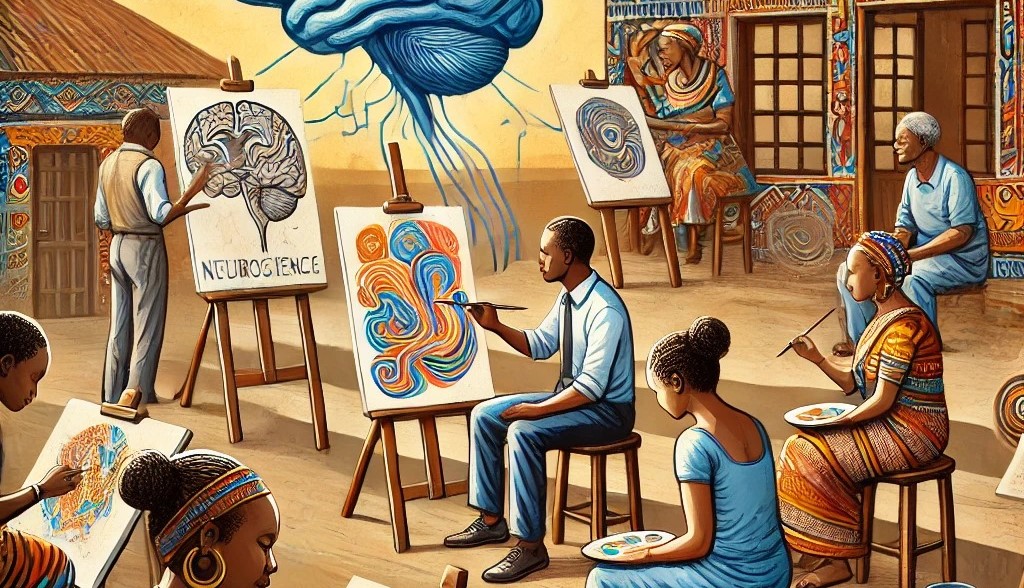The Role of Art Therapy in Neuroscience within the African Context: A Narrative Review with Insights from an Art Therapy Session In Kenya
Keywords:
Art therapy, Africa, PsychotherapyAbstract
Art therapy has been established as a powerful psychotherapeutic tool that utilizes artistic media to enhance mental and neurological well-being. This has been supported by various neuroimaging and electrophysiological studies which reveal its positive effects on brain function. This review emphasizes art therapy’s potential within the African context, where it could potentially help to address diverse neurological and psychological needs due to its adaptability to cultural nuances and effectiveness in non-verbal communication settings. The review also highlights an art therapy session aimed at addressing grief experienced by healthcare workers. This review also highlights the necessity for expanded educational programs, policy development, and research to integrate art therapy more comprehensively into African healthcare systems. These advancements are crucial for overcoming cultural and resource-related barriers, ensuring the accessibility and efficacy of art therapy within the African context.
References
Hu J, Zhang J, Hu L, Yu H, Xu J. Art Therapy: A Complementary Treatment for Mental Disorders. Front Psychol. 2021 Aug 12;12:686005.
Konopka LM. Where art meets neuroscience: a new horizon of art therapy. Croat Med J. 2014 Feb;55(1):73–4.
Lusebrink VB. Art Therapy and the Brain: An Attempt to Understand the Underlying Processes of Art Expression in Therapy. Art Ther. 2004 Jan;21(3):125–35.
Betts D. A Review of the Principles for Culturally Appropriate Art Therapy Assessment Tools. Art Ther. 2013 Jul 3;30:98–106.
Malchiodi CA, editor. Handbook of art therapy. New York: Guilford Press; 2003. 461 p.
Hogan S. Healing Arts: The History of Art Therapy. Jessica Kingsley Publishers; 2001. 338 p.
Kramer E, Gerity LA. Art as Therapy: Collected Papers. Jessica Kingsley Publishers; 2000. 276 p.
Arnheim R. For Margaret Naumburg. Arts Psychother. 1984 Mar;11(1):3–5.
Naumburg M. Dynamically oriented art therapy; its principles and practices, illustrated with three case studies [Internet]. New York, Grune & Stratton; 1966 [cited 2024 May 5]. 204 p. Available from: http://archive.org/details/dynamicallyorien00naum
King JL, Kaimal G. Approaches to Research in Art Therapy Using Imaging Technologies. Front Hum Neurosci. 2019 May 17;13:159.
Kaimal G, Ray K, Muniz J. Reduction of Cortisol Levels and Participants’ Responses Following Art Making. Art Ther. 2016 Apr 2;33(2):74–80.
Bolwerk A, Mack-Andrick J, Lang FR, Dörfler A, Maihöfner C. How Art Changes Your Brain: Differential Effects of Visual Art Production and Cognitive Art Evaluation on Functional Brain Connectivity. PLoS ONE. 2014 Jul 1;9(7):e101035.
von Bornstädt D, Gertz K, Lagumersindez Denis N, Seners P, Baron JC, Endres M. Sensory stimulation in acute stroke therapy. J Cereb Blood Flow Metab. 2018 Oct 1;38(10):1682–9.
Strøm BS, Ytrehus S, Grov EK. Sensory stimulation for persons with dementia: a review of the literature. J Clin Nurs. 2016;25(13–14):1805–34.
Hotz GA, Castelblanco A, Lara IM, Weiss AD, Duncan R, Kuluz JW. Snoezelen: A controlled multi-sensory stimulation therapy for children recovering from severe brain injury. Brain Inj. 2006 Jan;20(8):879–88.
Parrish J. Art and Aphasia: A Literary Review and Exhibition. Honors Theses [Internet]. 2014 Apr 23; Available from: https://scholarworks.wmich.edu/honors_theses/2445
Deshmukh SR, Holmes J, Cardno A. Art therapy for people with dementia. Cochrane Database Syst Rev. 2018 Sep 13;2018(9):CD011073.
Gabriel D, Chabin T, Joucla C, Bussière T, Tarka A, Galmes N, et al. An artistic approach to neurofeedback for emotion regulation [Internet]. bioRxiv; 2019 [cited 2024 May 5]. p. 794560. Available from: https://www.biorxiv.org/content/10.1101/794560v1
Darewych OH, Carlton NR, Farrugie KW. Digital Technology Use in Art Therapy with Adults with Developmental Disabilities. | Journal on Developmental Disabilities | EBSCOhost [Internet]. Vol. 21. 2015 [cited 2024 May 5]. p. 95. Available from: https://openurl.ebsco.com/contentitem/gcd:112038245?sid=ebsco:plink:crawler&id=ebsco:gcd:112038245
Valldejuli K, Belnavis Elliott LA. Shifting the narrative: an intersectional exploration of art therapy in the Caribbean. Int J Art Ther. 2023 Apr 3;28(1–2):58–64.
Solomon G. Development of Art Therapy in South Africa. Can Art Ther Assoc J [Internet]. 2006 Mar 1 [cited 2024 May 5]; Available from: https://www.tandfonline.com/doi/abs/10.1080/08322473.2006.11432281
Macmbinji VO, Gachigi PN. Art-Based Intervention in Determining the Quality of Life of Children with Autism and Their Parents in the Context of Educational Services in Kenya: A Systematic Review of Literature. Educ Child Dev [Internet]. 2022 Feb 18 [cited 2024 May 5];1(1). Available from: https://ojld.org/index.php/education/article/view/2
Kuria N, Wainaina G. PRE-POST TESTS ANALYSIS OF USING ART THERAPY AS TREATMENT FOR DEPRESSION: CASE OF LANG’ATA WOMEN’S PRISON NAIROBI – KENYA. 2019;5(1).
Gopalkrishnan N. Cultural Diversity and Mental Health: Considerations for Policy and Practice. Front Public Health. 2018 Jun 19;6:179.
Adoni- Kroyanker M, Regev D, Snir S, Orkibi H, Shakarov I. Practices and challenges in implementing art therapy in the school system. Int J Art Ther. 2019 Jan 2;24(1):40–9.
Beaumont SL. Art Therapy for Complicated Grief: A Focus on Meaning-Making Approaches. Can Art Ther Assoc J. 2013 Sep;26(2):1–7.

Downloads
Published
How to Cite
License
Copyright (c) 2024 East African Journal of Neurological Sciences

This work is licensed under a Creative Commons Attribution-NonCommercial-NoDerivatives 4.0 International License.

